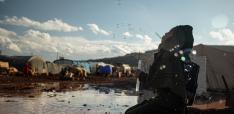Refugees as Contributors to Peace
Finding solutions to refugee situations is a struggle of the politically excluded for political inclusion. Resolving displacement inextricably links with achieving peace.
The majority of today’s 15 million refugees are fleeing armed conflict and situations of violence in countries of origin. With the continuing deterioration of the situation in Syria, states such as Lebanon have witnessed a rising influx of refugees: in fact, Syria’s neighboring countries alone are currently hosting about a third of the world’s total refugee population. In the same manner as the Syrian conflict has seemingly no end in sight, it has become increasingly difficult to resolve situations of displacement. UNHCR works on the basis that the average duration of a refugee situation now exceeds 17 years, but this statistic has recently been challenged.
As the current Syrian displacement signifies, most refugees are hosted in some of the world’s poorest and most unstable regions. Here – as elsewhere – they are frequently blamed for exacerbating conflict or frustrating efforts to reach peace. A recent survey concerning the Syrian refugee presence in Lebanon, for example, even revealed that Syrian refugees were identified by the Lebanese public as a main security challenge. Most survey respondents felt threatened and expressed increasing intolerance to the repercussions of the Syrian presence. In the current political climate, it is therefore imperative to shed light on how refugee participation in peace- and political processes often is crucial in many attempts to achieve peace in the country of origin (and in host communities).
The ideas of peace-building consist of a wide range of activities focusing among others on the social conditions that foster violent conflict—capacity building, reconciliation and societal transformation. In the context of refugees, I would like to highlight three notable ways to which refugees may make important contributions to peace-building: first, as contributors to the development of peace agreements; second, as participators in peace-building elections and referenda; and third, if they benefit from skills training and self-reliance.
Refugees have only too frequently been viewed as passive recipients of outcomes that are negotiated in distant arenas of power. They have throughout history only rarely been consulted or represented in peace processes, and peace-building initiatives have often marginalized them. Disregarding refugees’ interests may be outright destructive to peace processes – where opportunities for political participation are not guaranteed, refugees in exile risk becoming detrimentally politicized or militarized.
Today, however, there is a growing trend in which refugees are able to influence conflict and peace outcomes. Contemporary changes, not the least advances in communications technology, are giving refugees more prominent roles. Individual refugee elites have played important roles as participants in peace-building commissions and other forms of peace-building activities. For example, Somali diaspora have drafted strategic documents that constitute a basis for peace dialogues between conflicting factions within Somalia, and the Eritrean constitution was in part drafted by Eritreans in exile.
Many major peace agreements in the last decades have included references to, and often more detailed provisions on, refugees or other displaced populations. These agreements often incorporate legal protections for returning refugees with a view to both address past injustices and to prevent future rights violations. Burundian refugees, for example, participated in the Arusha Peace Process consultations where they promoted refugees’ interests in the negotiations. Issues put forward by refugees that were subsequently included in the peace agreement included the recovery of land and property, and procedures to guarantee the voluntary and safe return and reintegration of refugees into Burundian society. Unfortunately, in the preparations for the Geneva peace talks on Syria, refugees and internally displaced persons have been completely side-lined.
Refugees may also participate in peace-building elections and referenda without being forced to physically repatriate first. Noteworthy examples include the Eritrean independence referendum (1993), and elections in Bosnia (1996 and 1997), Kosovo (1999), Afghanistan (2004), Iraq (2005 and 2010), and South Sudan (2010 and 2011). The Eritrean referendum, in which 99.7 percent voted for independence, can be considered a highly successful example of refugee participation in peace-building through out-of-country voting. Some 300,000 Eritreans in exile, out of approximately 1.2 million (including children), registered for out-of-country voting—these amounted to around a third of the total electorate.
Experience nevertheless suggests that refugee participation in out-of-country voting is not always straightforward. The difficulties associated with such participation have, for example, been highlighted in the 2010 election in Iraq, where the nature and form of refugee participation were subject to fierce disputes, not the least because of continued sectarian struggles for political power. Another example is the 2014 Syrian presidential election, which was the first time that a Syrian election had allowed for out-of-country voting. In Lebanon, media reports focused on Syrian refugees being intimidated by Lebanese factions loyal to Syrian President al-Assad into participating in the elections and taking part in pro-Assad marches. This experience sheds troubling light on the participation of refugees in the recently announced parliamentary elections in Syria, scheduled for April 2016.
Skills training in exile, on the other hand, allows refugees to make important contributions to peace-building in their countries of origin. In a 2006 statement to the UN Security Council, the UN High Commissioner for Refugees noted that ‘refugees return with schooling and new skills … Over and over, we see that their participation is necessary for the consolidation of both peace and post-conflict economic recovery’. Such skills training may generally take two different forms. First, it may include being trained with a range of skills and qualifications that could address specific gaps in the provision of basic services in their country of origin. Such efforts may focus on health and education—notably, teacher-training programs in the Kakuma refugee camp in Kenya have been found to help address the significant shortage of teachers in South Sudan.
Such training may also assist in the actual implementation of peace agreements, where one major reason for their lack of implementation has been suggested to be a lack of local capacity to do so. Thus, in order to tackle the lack of educational opportunities for Syrian refugee youth, a group of exiled university professors recently launched the Free Syrian University in Turkey where they offer courses ‘to prepare educated generations who seek to build a country of law and justice and institutions’.
Second, peace education programs for refugees in exile could enhance prospects of reconciliation and conflict resolution upon return. For example, returnees will be better equipped to reconcile with former community members and mediate conflicts during fragile post-conflict and reintegration processes. Indeed, on several occasions, UNHCR’s Executive Committee has emphasized education for peace and the promotion of a culture of peace. As UNHCR also has noted:
While living in exile, long-term refugees also have an ideal opportunity to acquire valuable skills in areas such as leadership, advocacy, mediation and conflict resolution, which will again enable them to contribute to the rebuilding of their communities once return becomes possible.
Incorporating refugees into peace-building activities would also provide support to refugee-hosting States, who might perceive the prolonged presence of refugees as a burden and a security concern. In Lebanon, organizations such as Relief and Reconciliation for Syria combine peace-building and reconciliation work with humanitarian aid for those who are affected by the Syrian crisis. R&R Syria has established Peace Centers with the view of mitigating tensions among different sectarian groups within and between refugees from Syria and host communities in Lebanon in areas with many refugees. Similarly, from its exile base in Lebanon, the grassroots organization Hamzet Wasel coordinates peace education programs for children in Syria with a focus on building bridges between citizens and communities of different backgrounds and political views.
As is clear, then, refugees are imperative contributors to peace and should therefore play a direct role in peace-building. As has been noted by Katy Long, the search for solutions to refugee situations is very much a struggle of the politically excluded for political inclusion. Resolving displacement is as such inextricably linked with achieving peace.
Maja Janmyr is a Postdoctoral Researcher at the Faculty of Law, University of Bergen. She is currently a Visiting Researcher at the Issam Fares Institute of the American University in Beirut, where she is studying issues related to refugee rights in the Middle East. Dr. Janmyr is author of the book Protecting Civilians in Refugee Camps: Unable and Unwilling States, UNHCR and International Responsibility (2013). You can follow her at her Academia.edu page or on Twitter. This article was originally published by E-International Relations.
Photo credit: Photo Unit


